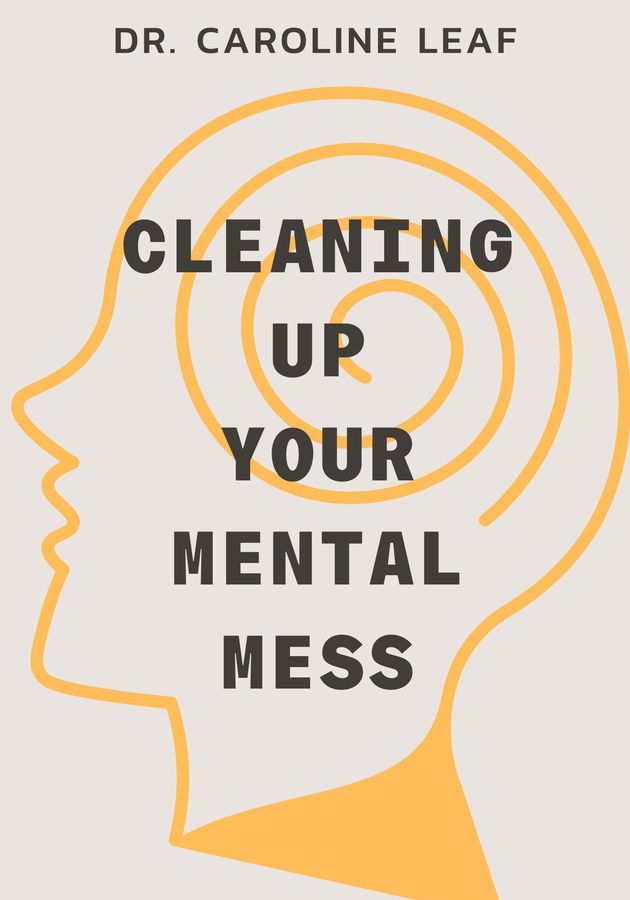Mental mess is something everybody experiences often, sometimes even several times a day. Unfortunately, no matter what many superficial self-help books will tell you, there’s no way to leave these episodes behind for good, because regardless of how much you might try to take charge of your life, some events and circumstances will always be beyond your control. Simply put, pain, suffering and stress are an inevitable part of life. It’s not our job to eliminate them, but to learn to live with them in a way that they won’t affect our wellbeing and happiness. Fortunately, that’s very possible, because as much as some events and circumstances can’t be controlled, our reactions to them can be.
This skill is called mind management and is precisely what Caroline Leaf’s 2021 book, “Cleaning Up Your Mental Mess,” is all about. Backed by clinical research and numerous case studies, it provides a 5-step plan to find and eliminate the roots of anxiety and depression. “If we don’t mind-manage our mental mess,” writes Leaf, “our life will feel like a mess.” Needless to say, the opposite is also true: the more you are in control of your thoughts, the more you are in control of your life in general. So, get ready to learn how to harness your thinking power and prepare to learn how to use this power to improve your life!
What is mind-management?
Ever since the beginning of time, humans have always battled mental health issues. The reason why most of them seem to be on the rise nowadays is twofold. First of all, we’ve become far more aware of the pervasive effects of mental distress. It’s not that people didn’t suffer from depression and anxiety in the past – it’s just that they talked about them far less than we do, due to social constraints and restrictions. That said, life in the 21st century has certainly worsened our mental health simply by being so fast-paced and now-oriented. As Leaf laments, “It’s almost as if we’ve entered an era where we have sacrificed the processing of knowledge for the gathering of data.” That’s where mind-management comes in.
Think of how one uses an Excel table. Sure, they might spend a lot of time feeding the spreadsheet with all kinds of information, but the table can only become useful to them if the information they put inside can be processed in one way or another. If it’s just slotted in haphazardly, if there are no formulas to allow the different cells to communicate with each other in meaningful ways, then the spreadsheet would quickly devolve into a bunch of disparate numbers and letters that wouldn’t mean anything to anyone. Not only that, but seeing those numbers and letters would probably make one feel quite uncomfortable, anxious and even depressed. Just as we don’t like cluttered rooms, we don’t like cluttered documents as well.
Well, your mind is no different at all: it prefers order to clutter. However, unless you find a way to manage the data it constantly gathers, you are turning it into a harbor for meaningless, mental mess. “Mind-management is a skill that needs to be learned and constantly upgraded as we grow from childhood into adulthood,” explains Leaf. “We all have to learn how to catch and edit our thoughts and reactions before they trigger toxic chain reactions and become ingrained neural networks, a.k.a. bad habits. Whenever we think, the brain literally changes in hundreds of thousands of ways, on cellular, molecular, chemical, genetic, and structural levels – the key to mind-management is that you learn how to direct this process!”
What is the mind?
The mind is divided into three parts: the conscious mind, the nonconscious mind, and the subconscious mind. The conscious mind is awake only when you’re awake and functions best when you are “deliberate, intentional, actively self-regulated, and proactive.” The nonconscious mind, on the other hand, is always online. Leaf describes it as “the swirling, high-energy powerhouse that works 24/7, where all memories are stored,” as well as “our wisdom and intelligence.” Not only that, but the nonconscious mind is in constant communication with the subconscious mind, working to bring balance and clean up your mental mess. Finally, the subconscious mind can be described as the “just aware” part of your mind. It works as a sort of a funnel through which our thoughts can move from our conscious mind to the nonconscious and vice versa.
Even though people tend to use the terms “mind” and “brain” interchangeably, the two are quite different. The brain is a physical thing, an organ composed of nerve cells, that is located inside your skull. The mind, on the other hand, comes in the form of mental energy, separate, yet inseparable from, the brain. Whenever we think, feel or make decisions, we generate energy with our mind. This energy is then converted into thoughts which are physical structures that can affect our brain. Hence, even though it might seem sometimes that it is our brain that forces us to do things, it’s actually the other way around: it is us who can force our brain to influence our innermost selves by way of the mental energy we produce, that is to say, by way of our minds.
The ability of our mind to build thoughts and, through them, cause changes in our brain is called neuroplasticity. Mind management is possible solely because of neuroplasticity. The fact that there is a link between your mind and your brain is what makes it possible for your brain to modify, change, and adapt both structure and function in response to your experiences. Absolutely everything you will ever experience in your mind will also be experienced in your brain and body, by way of your thoughts. If the energy your thoughts produce is toxic, then you’re risking an explosion. Over time, if not dealt with, this toxic energy will amass in your nonconscious mind until one day it blasts back through your subconscious mind to your consciousness, affecting the way you think, feel, and choose in an uncontrolled way. Fortunately, there is a way to control the process. Leaf calls it the Neurocycle.
The Neurocycle: principles and steps
Whether you want it or not, your mind constantly changes your brain’s structure and its functions. Mind management is all about taking control of this process. When done correctly, it makes beneficial neuroplasticity possible, by helping facilitate “talk” between the conscious, subconscious and nonconscious mind. Since it’s the thoughts that make all the difference and since you’re thinking all the time – on average, once every three seconds, you need to learn how to manage your mind constantly. As Leaf explains, “The way you use your mind can rebuild and strengthen your brain, even when you have gone through the traumas of life. You can bring your brain under your control, no matter your past and no matter your present. You can capture and control thoughts and reconceptualize your thinking.”
Mind-management can transform information into applied knowledge. In other words, it can help you turn the good advice you gather through life into relevant actions and deeds, and eventually even in the life you’ve always desired. You know what they say, after all: “Watch your thoughts, for they become your words; watch your words, they become your actions; watch your actions, they become your habits; watch your habits, they become your character; watch your character, it becomes your destiny.” The best way to watch your thoughts – which stand at the root of your destiny and are the be-all and end-all of your life – is through using the Neurocycle, which is how Leaf calls her simplified formula for healthy mind-management.
The foundational principles of the Neurocycle are embracing, processing, and reconceptualizing. Embracing means acknowledging and accepting the warning signals your brain and body send you when faced with toxic thoughts. The second principle, processing, entails “deep, intentional, and focused thinking, which forces the conscious mind and nonconscious mind to connect.” Finally, reconceptualizing means “redesigning the thinking, feeling, and choosing behind the thought by learning from the lessons of the past.” The five steps of the Neurocycle are designed to sync with the three foundational principles. The first step, gathering information, involves embracing your thoughts, even when they are toxic or traumatic. The two steps which follow – reflecting back and writing – are the processing steps of the Neurocycle. Finally, the last two steps – rechecking and actively reaching out – are the ones that help you reconceptualize your thinking to build new habits. Now, let’s see the five steps in action.
Neurocycling to develop mental toughness
As complex and exceptional as it is, your mind is just another muscle in your body. Just like all other muscles, the more you exercise it, the stronger it gets and the more it can expand. To develop the analogy even further, in this regard, you can think of the Neurocycle as a treadmill: the more often you use it, the more prepared you will be for the marathon that is your life. Here’s a simple overview for how to use the 5 steps of the Neurocycle for brain-building and developing mental toughness:
- Gather. Just like your body needs healthy food to thrive, your mind needs healthy information. Hence, with respect to brain-building, the first step of the Neurocycle is all about choosing the right information to embrace. It can be a book, an article in a magazine, a YouTube video, a podcast. After spending a few minutes with the educational tool of your choice, move to the second step – the first of the two processing steps of the Neurocycle.
- Reflect. According to Leaf, “The Golden Rule of the 5 Steps is to think to understand the information you’re trying to remember.” This process of thinking to understand involves three separate steps: asking, answering, and discussing. In other words, when it comes to brain-building, reflecting is all about understanding the who and the what of the gathered information, as well as about answering your own questions and discussing what you’ve read with yourself.
- Write. Now that you’ve analyzed what you’ve gathered, it’s time to put it into writing. It’s really important to write things down, because writing forces you to think about thinking. Leaf recommends using a brain-friendly way of note-taking called the Metacog which is essentially a mind map, that is to say, a tree-like structure of connected thoughts.
- Recheck. The first step of reconceptualizing is rechecking. If writing reinforces healthy dendrite growth, rechecking helps build useful long-term memory into them. To recheck, “all you have to do is deliberately and intentionally go through what you’ve written, either in your journal or on your Metacog, to see if it makes sense, and if it has all the necessary information on it.” If something doesn’t make sense to you, go back to the first or second step.
- Active reach. In the final step, the goal is to stop being a learner and become a teacher. Indeed, the best way to know if you’ve acquired some information is to try to relay it to someone else. So, reteach what you’ve studied to someone else – your dog, your cat, or whoever would listen to you. You can even teach it to the imaginary students in your room. The point is to actively reach out. Because it is often by reaching out that we reach in the deepest. Brain building is no exception.
Final notes
In many ways, “Cleaning Up Your Mental Mess” combines and distills many of Caroline Leaf’s other books and her decades-long research into the secrets of the brain into a simple, 5-step formula. That said, we feel the book is a bit unstructured for its own sake, not to mention overly self-promotional. Not only does it often advise the reader to consult Leaf’s other books for more information on certain topics, but it also endorses buying the rebranded Neurocycle app (formerly Switch app), for which a subscription costs $70. In short, heed the science, ignore the advertising.
12min tip
You can go three weeks without food, three days without water, and three minutes without oxygen – but you can’t go even three seconds without thinking. That’s why the most important thing you’ll ever learn is how to manage your thinking. Leaf’s Neurocycle is a great mind-managing method. It involves five steps: gathering, reflecting back, writing down, rechecking and reaching out. Use these steps as often as possible – they can literally change your mind and, thereby, everything else.





























